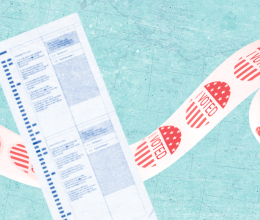COLUMBUS, Ohio — The American Civil Liberties Union, ACLU of Ohio, and Lawyers’ Committee filed a federal lawsuit today challenging Ohio’s flawed system of matching voter signatures on absentee ballots and absentee ballot applications. The case was filed on behalf of the League of Women Voters of Ohio, the A. Philip Randolph Institute of Ohio, and an individual.
“Record numbers of Ohioans will vote by mail in the November 2020 election. But the patchwork of signature-matching processes across our state is incredibly subjective and fraught with error. On top of this, voters don’t get adequate notice or opportunity to fix their supposed mismatches. This will disenfranchise tremendous numbers of people,” said Freda Levenson, legal director of the ACLU of Ohio.
“Ohio’s confusing, inconsistent signature-match process too often results in eligible Ohio voters incorrectly having their absentee applications or ballots rejected,” said Jen Miller, executive director of the League of Women Voters of Ohio. “Without clear notification or an efficient way to address questions about their signatures, too many voters are disenfranchised by this process, especially those with disabilities, senior citizens, young people, and naturalized citizens. Especially during a global pandemic, Ohio voters must be able to efficiently secure absentee ballots and have assurance that their votes will count.”
Election officials — who have no handwriting-analysis expertise — are currently allowed to reject an absentee ballot or ballot application, sometimes without notifying the voter, if they think there is a signature mismatch on the voter’s paperwork.
Counties also differ as to the standards they use to analyze signature matching, the procedures they follow to reject perceived mismatches, the notice they provide to voters whose applications are rejected, the opportunity they give to cure absentee ballot applications that have been rejected on the basis of signature mismatch, and the record-keeping they do to document this activity.
“County election officials may be doing the best they can, but the current system is designed to fail. Everyone loses here — election staff who are not adequately trained or equipped to assess signatures, and voters who in turn could see their ballots illegally and arbitrarily tossed,” said Alora Thomas, senior staff attorney with the ACLU’s Voting Rights Project. “Ohioans’ fundamental right to vote is at risk here, and state officials can and should fix this broken system immediately, especially given the COVID-19 pandemic.”
“Ohio’s extremely flawed signature-match process disenfranchised voters in the primary and will disenfranchise voters in the general election. All voter suppression tactics — no matter the shape or size — disproportionately affect voters of color and we cannot allow this to happen. The right to vote is sacred and should be treated as such,” added Andre Washington, president of the Ohio A. Philip Randolph Institute.
The lawsuit notes that the right to vote absentee by mail is all the more crucial for the upcoming November election in light of the COVID-19 pandemic, which makes casting a ballot in person dangerous for many Ohio voters — especially people who are older and those with pre-existing medical conditions.
People with disabilities, older people, and people for whom English is a second language are also among those who may be more likely to have fluctuating handwriting, and are especially at risk of having their ballot rejected.
The groups are asking the court to declare the current signature-matching policies unconstitutional and issue an order to Secretary of State Frank LaRose to cease all signature matching of absentee ballot applications and ballots until a uniform and constitutional standard across county boards of elections is implemented.
“Ohio’s signature-match processes for rejecting absentee ballots and absentee ballot applications threaten to disenfranchise thousands of otherwise eligible voters. In recent elections, these arbitrary practices tend to disproportionately impact Black voters, other voters of color, young voters, elderly voters, and disabled voters,” said Kristen Clarke, president and executive director of the Lawyers' Committee for Civil Rights Under Law. “No voter should have an absentee ballot rejected because of rules that allow officials to use unreliable and arbitrary methods to review signatures while also failing to give the voter notice and opportunity to cure any issues.”
The lawsuit, League of Women Voters of Ohio v Frank LaRose, was filed in U.S. District Court for the Southern District of Ohio.





